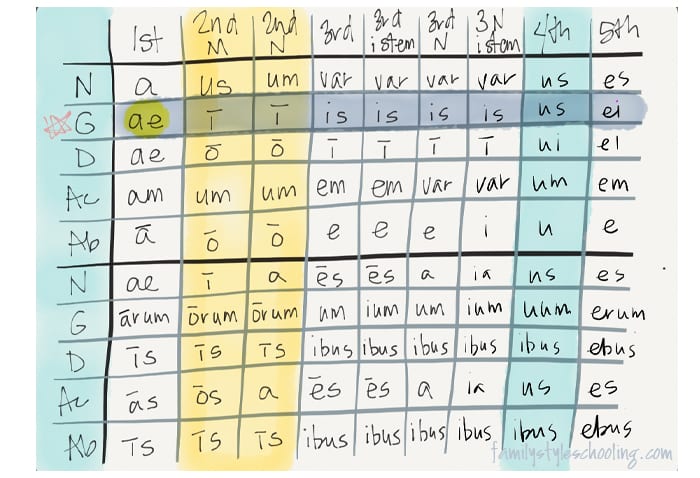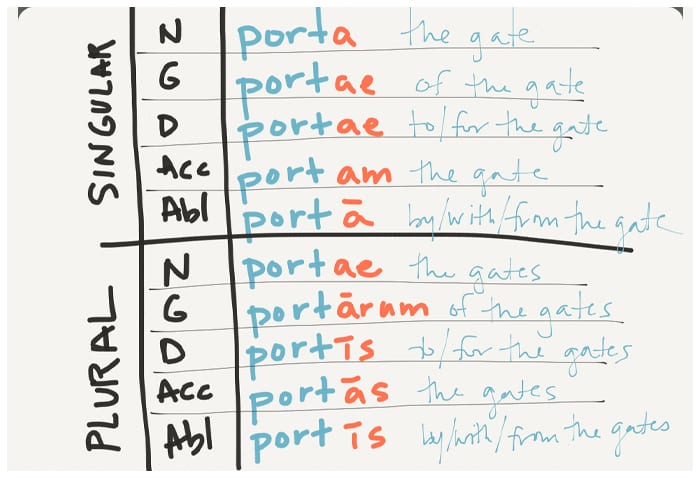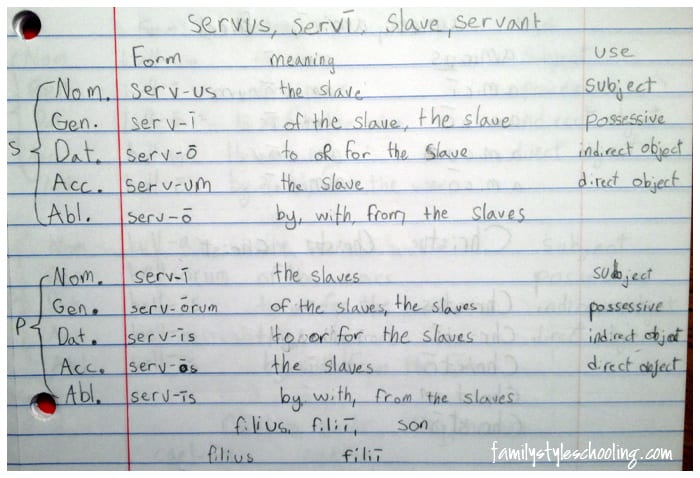Latin in the Grammar Stage – Playing with Nouns
In our last adventure together, I gave you my recommendations for materials to use in your study of Latin. However, if you're like me, and can't quite figure out how to get all of the separate workbook studies done in the day, I'd like to offer another option! If you are familiar with the classical approach to education, the grammar stage is the foundational stage on which to hang all other learning. Let's play with Latin nouns and start learning how they work!

Hello, Latin noun endings!
In Cycle 1 in the Foundations program of Classical Conversations, we memorize Latin noun endings - they're called declensions. Middle and High school students often find their Latin exercises take excessive time due to the fact that they do not have these forms clearly solidified in their minds. Using songs to memorize the different endings is extremely helpful. To take your grammar level study a step further, let me give you a basic overview of how Latin nouns work, and then how you can play with them to solidify the grammar in which to build upon as they grow.
Wait a minute . . . What's a noun again?
You all probably remember learning that a noun is a person, place, thing, activity, or idea. Unfortunately, it's not enough to just define a noun. We might be able to pick them out in a sentence, but it's even more important to understand what jobs nouns do. There is a name for each job in Latin and in English. I'll list the jobs and give you an example.
- Nominative - Subject: The mother loves. The subject is what the sentence is about.
- Genitive - Possessive Noun Adjective: The mother's child eats. ~OR~ The child of the mother eats. The possessive noun adjective expresses ownership.
- Dative - Indirect Object: The child gives the mother a hug. ~OR~ The child gives a hug to the mother. This one is tricky to detect, but it is best known as the recipient of the action but not the primary object.
- Accusative - Direct Object: The child kisses the mother. Direct objects are only found when the verb is transferring action of some kind. Here the mother is the primary object receiving the action.
- Ablative - Object of the Preposition. The child dances around the mother. These are the easiest to identify once you know your prepositions.
While we used the same noun in each sentence, each time the job the noun accomplished changed. In English, we use the position of the noun in the sentence to identify the job. In Latin, nouns have roots, and then their jobs are identified by the different endings. The jobs in Latin are referred to as "cases."
Cases. Got It. What's a declension then?
Declensions are like families of words that all change their endings the same way. In Latin, there are 5 declensions. Within those 5 families, there are a couple of variations, but memorizing the first column in each declension is a sufficient start. The chart below is what the Challenge students practice over and over and over and over until they can write it out effortlessly.


The row at the top identifies the declensions, and the column on the left identifies the case. Nouns will be presented in vocabulary lists in this format: Nominative singular, Genitive singular. You can find out what declension a noun belongs to by looking at the ending of the genitive singular (the row above that is highlighted dark blue). After you've identified which declension the noun belongs to, then you can find the root of the word. The root is the genitive singular minus the ending. For the example above, "port" is the root. Once you have your root, you can just replace the endings to change the job of the noun. To decline a noun means to go through all of the possible endings of the noun:

Cases, declensions . . . Is that all there is?
Excellent question! There is one more important feature of Latin nouns that is important to identify - gender. That's right, all Latin nouns are qualified by one of three genders: masculine, feminine, or neuter. Conveniently, you don't have to decipher the gender of ambiguous nouns such as heaven or peace. Each declension has rules that govern the nouns contained in the family.
- First Declension nouns are feminine unless they specifically refer to a male - like a sailor.
- Second Declension nouns are masculine unless their Nominative singular ends with "um"...then they're neuter.
- Third Declension nouns are complicated...they can be masculine, feminine, or neuter. I'll save that explanation for another day!
- Fourth Declension nouns are primarily masculine.
- Fifth Declension nouns are primarily feminine.
What do I do now?
Now you start to trust. What I have found amazing in my own studies is that copy work causes me to slow down and observe. If your children are in the grammar stage of Latin, they have time to sit and copy and observe. Find a list of Latin vocabulary and decline a word a day. You can use a formal worksheet, notebook paper (see picture below), or just complete it orally.

Declining is Playing?? How do you define play?
Declining is enjoyable for a grammar stage student just like they repeat the same sound in the car when you're driving, or sing the same phrase of a song over and over. They love identifying forms and seeing patterns, running in circles around the living room, or jumping up and down on the mini-trampoline. The beauty of "studying" Latin in this way is that you can tend the soil of the young linguist without a great deal of extra work or expense. If you'd like to get your little language learner started with declining, here are some free noun charts that they can use to practice learning their noun endings!
Caution: this path requires great patience. This is under-the-ground, in-the-dark, behind-the-scenes, off-the-radar kind of work that doesn't produce instant fruit. But the foundation you can build with this kind of study will be able to support a mighty oak in the future.
What do I do when I've mastered the noun charts?
When you feel like your mini Latin scholar is ready, have them hop in with Andy and his goofy Latin videos for young learners. He treats Latin like a puzzle—a fun code that everyone can crack. Hand your learner some sleuthing goggles and jump into Latin with Andy Code Breakers. All the videos are free, and if you watch to the end of each one, you might just find a hilarious surprise!
Nouns are just the start of a wonderful learning world
When Andy and I started making resources for Latin learners like you, we created them with my nephew in mind, who had jumped into the Latin world in high school and had no idea where to start. Latin can be scary at any stage of the journey, but don't worry. It's not too late! The Latin with Andy resource library is a tool to walk students step-by-step through middle and high school Latin. It's set up to allow for a student of any age to hop on into the Latin world at any stage of learning. So, it's available for your older students, and Andy will be waiting for your little Latin learners to join him when they're ready. 😉
All of our Latin resources, including fun courses on music, art, Greek, homeschooling, and more, can be found on our community platform, Rooted Minds. The Rooted Minds Learning Community is a place where we are seeking to redefine community, "sharing everything in common" as the early church did. And that includes skills and knowledge! No learner left behind! If you'd like to see what Rooted Minds has to offer, click here. We would love to have you join our community and hop into some Latin fun with Andy!

In my next post, we'll take a look at how to approach a study of Latin verbs in the grammar stage.
Betsy Strauss is an unexpected homeschooler, mother of three, who is in a relationship with a sweet man for life. She loves reading books, drinking coffee, and learning anything with her kids.


[…] opportunities provided in your area. In the meantime, check out Betsy Strauss’ blog at http://www.familystyleschooling.com. The link provided will take you to one of her great Latin blog posts. You won’t regret […]
[…] study of Latin. I believe so much in the classical model, that tomorrow I’ll be sharing tips for playing with the grammar memory work from Classical Conversations, and how that can become a formal study of the language in […]
Hi Betsy, another Latin lover reporting in. What would be the latin translation for the word ‘art’ ? And what would be the complete latin noun declension for the work ‘art’ ?
Many thanks.
All the best
Raymond
I looked it up on wiktionary: https://en.wiktionary.org/wiki/ars#Latin and the word is “ars, artis”. It’s a 3rd declension i-stem so it would be: (singular) ars, artis, arti, artem, arte (plural) artes, artium, artibus, artes, artibus. Have fun!